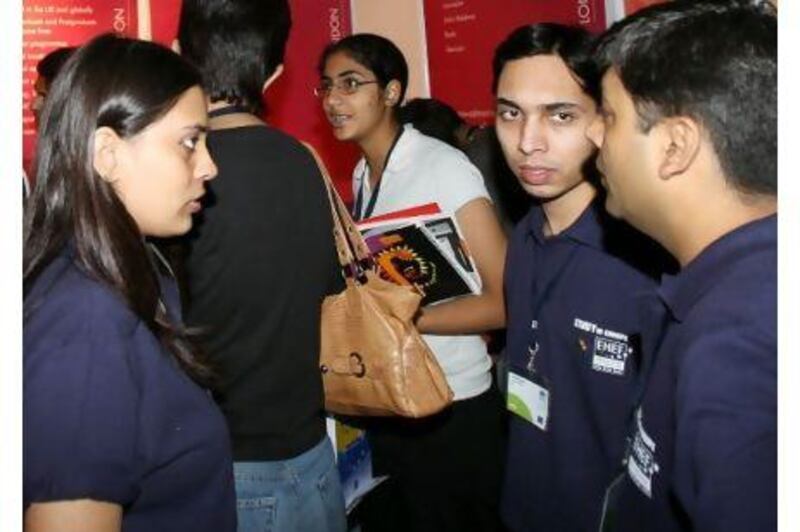LONDON // The British government announced yesterday limits on the number of non-EU students allowed into the UK, a measure that is expected to affect tens of thousands of young Indians.
Announcing new limits on work permits for foreigners, Theresa May, the home secretary, also outlined plans to slash the number of non-EU students coming to privately funded colleges and enrolling in courses that were below degree level.
In recent years, Britain has become the top foreign destination for Indian students with the number of visa applications reaching a record 57,500 this year - almost four times what it was in 2004-05.
Currently, more than 40,000 Indians are studying in the UK but only about 12,000 are enrolled in courses leading to degrees. Only China sends more students to the UK but almost all of those are in graduate or post-graduate courses.
There has been growing concern in Britain that the surge in student visa applications from the subcontinent has been driven by the wish of young Indians to emigrate to the UK by enrolling in courses at bogus colleges and then simply staying on in the country.
Other young Indians have been conned into paying thousands of pounds to study at these "chip shop" colleges only to find the courses on offer were of little value.
"There is a significant abuse of the system and we are getting tough on bogus colleges that dash hopes of young Indians, which is also bad for our reputation as an educational destination," David Willetts, the minister for universities and science, said during a trip to India this month.
The British government intends to make the eligibility criteria for visas much tougher for non-EU students. The current total of about 280,000 would need to be cut by 87,000 a year to meet the government's target of reducing net immigration to the UK to "tens of thousands" by 2014, according to the Migration Advisory Committee.
UK Border Agency officials have been monitoring the surge in student visa applications from India for some time and, in February, temporarily suspended the processing of all such applications from northern India, Nepal and Bangladesh following an unprecedented rise in numbers.
British officials said the system became overwhelmed after 13,500 applications from northern India were made in the last three months of 2009, compared with 1,800 during the corresponding period in 2008. The ban was relaxed after a month when the level of applications fell back.
At present, about 90,000 non-EU students attend private colleges to study for anything from basic high-school certificates to vocational qualifications.
According to the Home Office, investigations are being carried out into the legitimacy of 40 per cent of the 2,000 private colleges in Britain.
Mrs May has made it clear that students enrolling in non-university courses will bear the brunt of the crackdown announced yesterday.
"People might imagine that by students we mean people who come here for a few years to study at university and then go home - but that's not always the case," she said in a speech this month. "We estimate that nearly half of all students coming here from abroad are coming to study a course below degree level.
"We have to question whether these are the brightest and the best that Britain wants to attract - they may be, or they may not.
"Let me make clear: I will do nothing to prevent those coming here to study degree-level courses and I will protect our world-class academic institutions above and below degree level.
"The sheer number of students coming in, and the large proportion of total inward migration this represents, means we cannot delay in taking this necessary and decisive action."
Last year, an investigation of bogus colleges by The Times newspaper found that visas were given to Indian students, some of whom were illiterate, while others had enrolled on "hospitality management" courses believing that they would qualify them to work in hospitals.
Nevertheless, British universities are worried that the latest moves could limit their own ability to attract overseas students, particularly as they come just weeks after the government announced that tuition fees would be increased to a maximum of £9,000 (Dh52,700) a year in 2012, almost triple what they are now.
Christina Yan Zhang, international students' officer for the National Union of Students, said the UK had to compete with a growing number of EU countries that offered degree courses taught in English, as well as the rise of India and China as destinations for overseas study.
"Many other EU countries still offer free education to their students, as well as to students from other EU countries, which weakens the position of UK universities and means many students who would have come to the UK will choose more affordable options elsewhere," she said.






